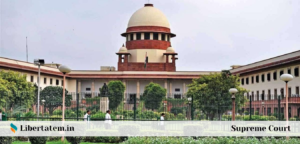High Courts are bestowed with power under Article 227 of the Indian Constitution, and the powers of the Supreme Court is enshrined in Article 136 of the Constitution. What happens when the High Court decides to exercise its power in a similar fashion to the Supreme Court?
Facts
Ms Sunita Agarwal had purchased the property in 2006 which later on due to an order by the Board of Revenue could not be transferred in her name. This was challenged before the High Court of Madhya Pradesh. The High Court merely dismissed the plea without furnishing any details or reasons. The Indore bench had passed the order on February 27, 2019. The same was challenged before the Supreme Court. The Supreme Court took cognisance of this and analysed the actions of the High Court of Madhya Pradesh and deemed it overstepped its Constitutional power constraints by acting as under the power of the Supreme Court.
Decision
 The bench comprising of Justice S.K Kaul and Hrishikesh Roy emphasised that the way the matter was handled by the High Court was not in accordance to the powers of Article 227, but rather was in par with the provisions of Article 136. It was held that
The bench comprising of Justice S.K Kaul and Hrishikesh Roy emphasised that the way the matter was handled by the High Court was not in accordance to the powers of Article 227, but rather was in par with the provisions of Article 136. It was held that
“The approach of Article 136 of the Constitution cannot be adopted while deciding petitions by the High Court under Article 227 of the Constitution of India. We are thus constrained to set aside the impugned order and remit the matter back for reconsideration so that the order to be passed one way or the other records reasons for the same, albeit even if they are brief. In view of what has transpired in the impugned order, it would be in the fitness of things that the matter is placed before another learned Judge.”
The matter was reassigned to another bench of the Madhya Pradesh High Court for re-examination and adjudication by deciding that
“There is no reflection of these so called submissions which are stated to have been advanced at length. It is not necessary, in our view, in the matter like this to record elaborate reasons but since these matters are carried forward to this Court, the reasons, albeit brief, have to be recorded to facilitate this Court to understand what weighed with the learned Judge while dismissing the petition.”
The Supreme Court clearly emphasised the High Court could not act in accordance with the powers that were bestowed on the Supreme Court.
Libertatem.in is now on Telegram. Follow us for regular legal updates and judgement from the court. Follow us on Google News, Instagram, LinkedIn, Facebook & Twitter. You can also contribute blog, articles, story tip, judgment and many more and help us spread awareness for a better society. Submit Your Post Now.

